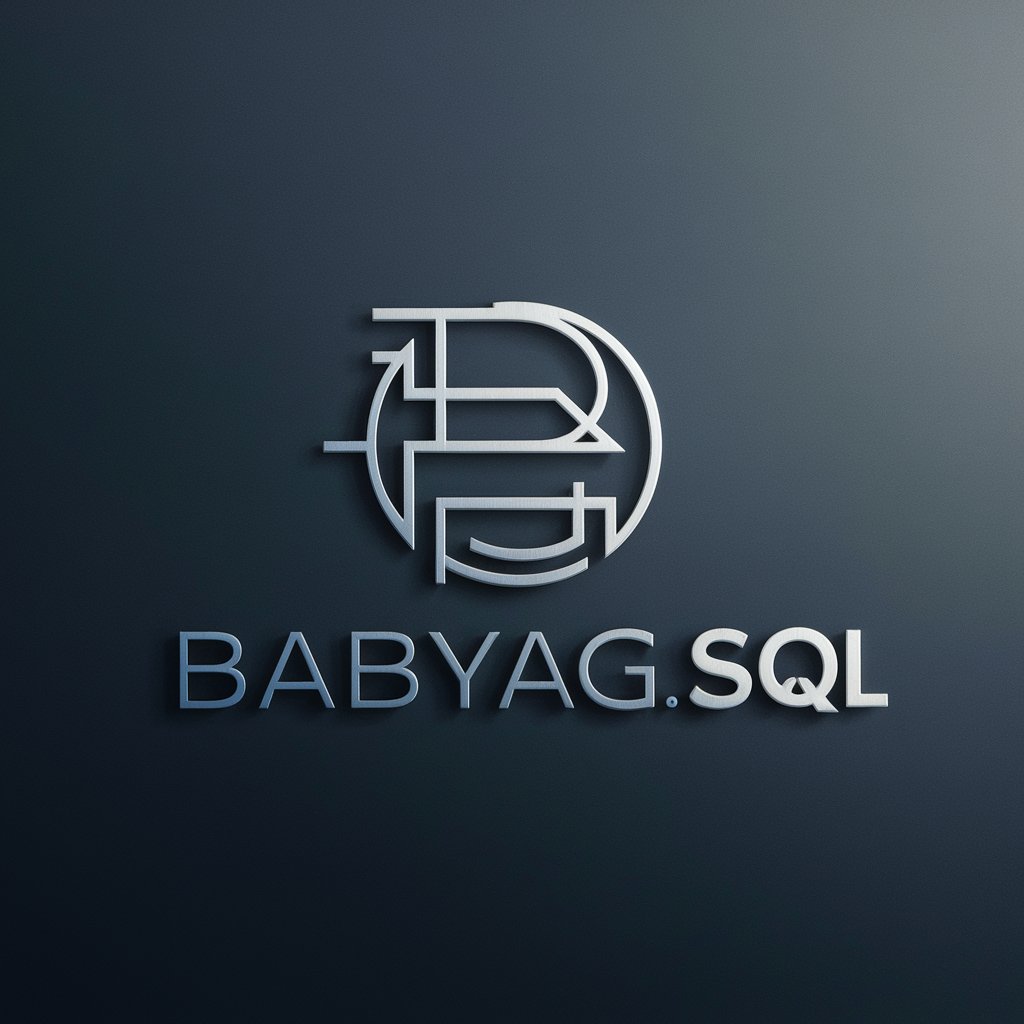BabyAgi.sql - Comprehensive guide and insights on BabyAgi.sql, covering usage steps, FAQs, application scenarios, SEO essentials, and a captivating tagline.

Hello! Let's get started with your tasks.
Empowering Your Ideas with AI
Describe the main features of BabyAgi.sql.
List the steps to use BabyAgi.sql effectively.
Explain how BabyAgi.sql manages tasks and memory.
Outline the benefits of using BabyAgi.sql for productivity.
Get Embed Code
Introduction to BabyAgi.sql
BabyAgi.sql is a specialized version of ChatGPT, designed for task management and memory recall. Its core function is to interactively assist users by organizing tasks, tracking progress, and recalling previous conversations. Unlike standard ChatGPT models, it integrates a SQLite database to store and retrieve information. This design enhances continuity in interactions, making it ideal for ongoing projects or complex task management scenarios. For instance, in a project management scenario, it can keep track of different stages of a project, associated tasks, and provide updates or summaries when requested. Powered by ChatGPT-4o。

Main Functions of BabyAgi.sql
Task Management
Example
Recording and updating a list of tasks for a software development project.
Scenario
A project manager uses BabyAgi.sql to maintain an organized list of tasks, subtasks, and their statuses, ensuring efficient workflow.
Memory Recall
Example
Retrieving information from previous interactions.
Scenario
A user revisits a complex topic discussed earlier and requests a summary or additional details, which BabyAgi.sql provides from its database.
Progress Tracking
Example
Keeping track of project milestones and deadlines.
Scenario
In a research project, BabyAgi.sql helps in tracking progress against set milestones, reminding the team of upcoming deadlines.
Ideal Users of BabyAgi.sql Services
Project Managers
Project managers can leverage BabyAgi.sql for organizing tasks, tracking project progress, and managing team responsibilities, especially in complex or long-term projects.
Researchers and Academics
Researchers and academics can use BabyAgi.sql to keep track of their research findings, notes, and timelines, making it a valuable tool for managing extensive research projects.
Personal Productivity Enthusiasts
Individuals interested in personal productivity can use BabyAgi.sql to manage their tasks, goals, and personal projects, aiding in effective self-organization.

How to Use BabyAgi.sql
1
Visit yeschat.ai for a complimentary trial without the necessity for login or a ChatGPT Plus subscription.
2
Choose 'BabyAgi.sql' from the available tools list to initiate your unique AI-driven experience.
3
Configure BabyAgi.sql for your specific needs by selecting the desired functionality from its settings menu.
4
Input your task or query directly into the BabyAgi.sql interface, utilizing natural language for ease of use.
5
Review the generated output, applying any feedback or adjustments as necessary to refine the results.
Try other advanced and practical GPTs
Marv'
Experience Sarcasm at AI Speed

Gratitude Muse
Cultivate Gratitude with AI-Powered Reflection

FLEX.LINK
Monetize Creativity, Anonymously

PlaylistAI
AI-Powered Personalized Music Experience

Filtir
Uncover Truth with AI Precision

TinyAI
Empowering Interactions with AI Technology

Manga Miko - Anime Girlfriend
Your Playful Anime Companion, Powered by AI

Canva
Design Anything, Anywhere with AI

Debate Master
Elevate Debate with AI Insight

FantasyGPT
Your AI-Powered Fantasy Football Strategist

Fantastic Tales!
Navigate the cosmos with AI-powered storytelling.

CatGPT
Chat with AI, Cat-Style!

Frequently Asked Questions About BabyAgi.sql
What is BabyAgi.sql designed for?
BabyAgi.sql is designed to assist users with a wide range of tasks by leveraging AI, from data analysis and management to creative content generation and problem-solving.
Can BabyAgi.sql process natural language queries?
Yes, BabyAgi.sql is capable of processing and understanding natural language queries, making it accessible and efficient for users without technical expertise.
Is there a limit to the number of tasks BabyAgi.sql can handle at one time?
While BabyAgi.sql is highly capable, the number of simultaneous tasks it can handle effectively may depend on the complexity of the tasks and the resources allocated to it.
How does BabyAgi.sql ensure user data privacy?
BabyAgi.sql is designed with user privacy in mind, employing secure data handling and processing practices to protect sensitive information.
Can BabyAgi.sql be customized for specific use cases?
Absolutely, BabyAgi.sql offers customization options allowing users to tailor its functionality to meet specific requirements or preferences.
